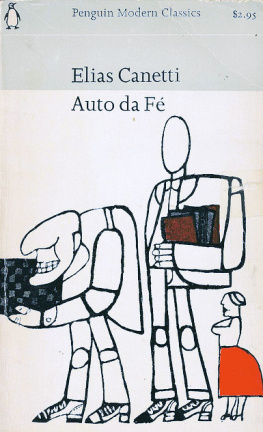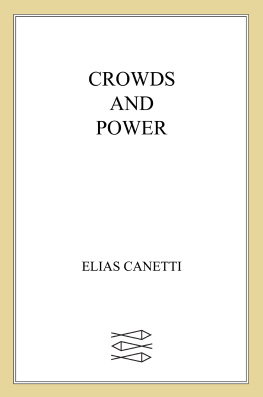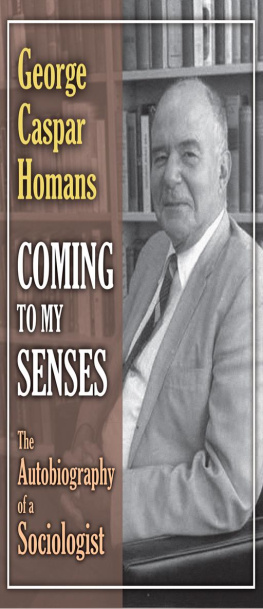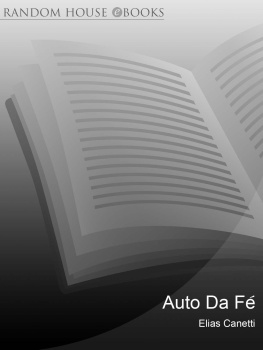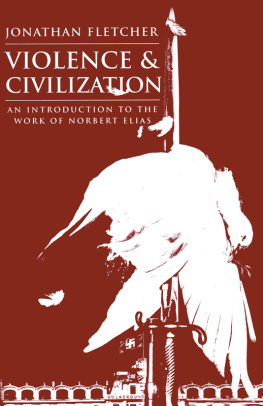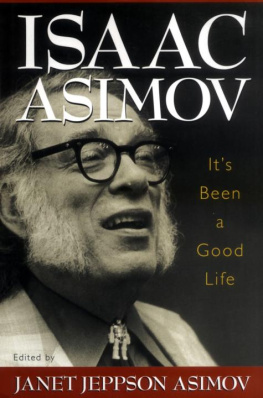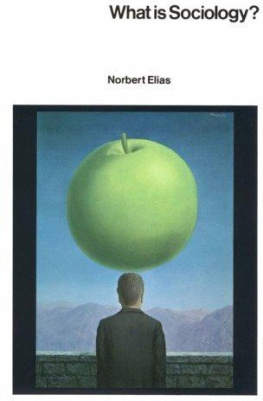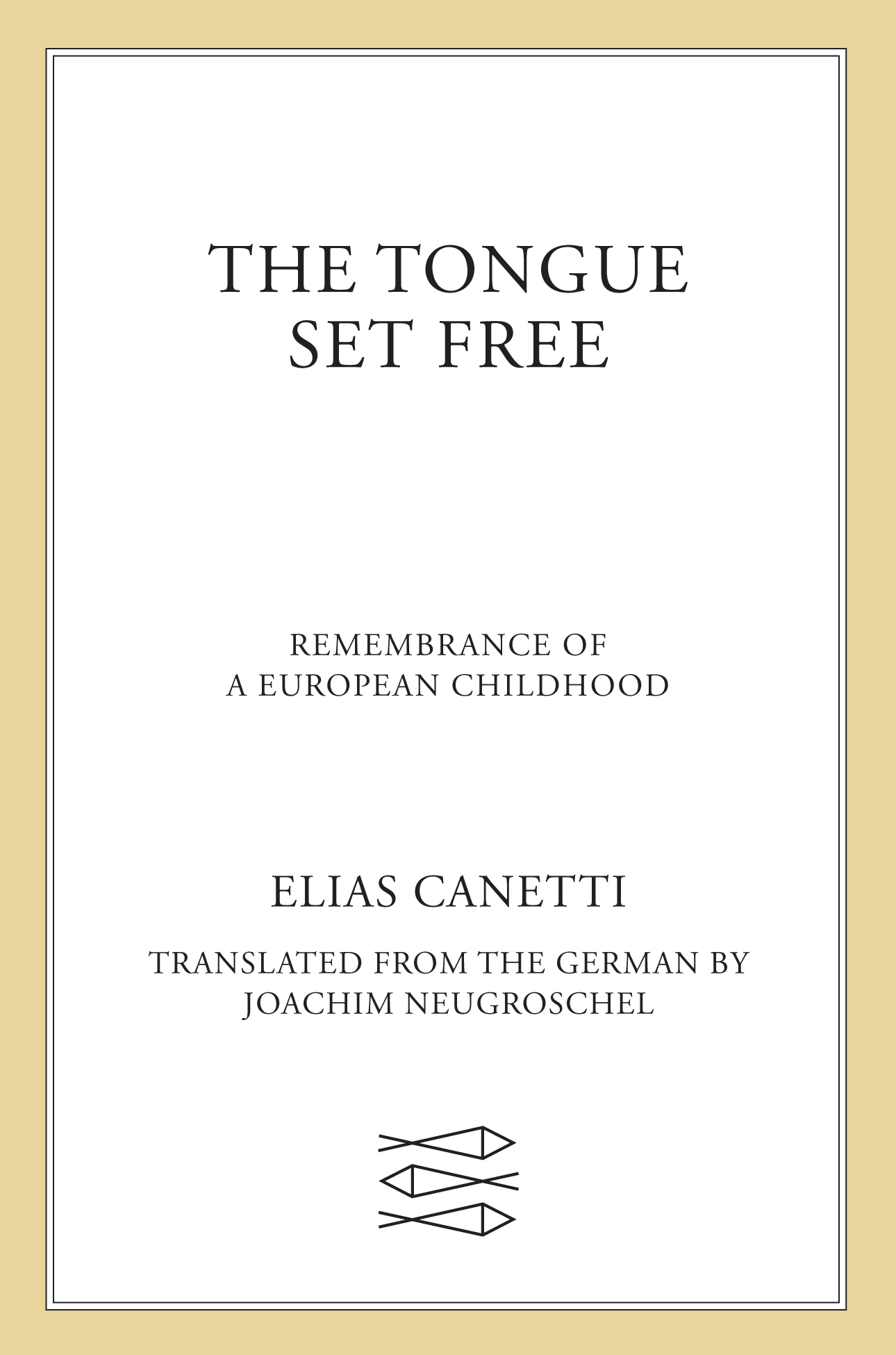Contents
Guide
Pagebreaks of the print version

The author and publisher have provided this e-book to you for your personal use only. You may not make this e-book publicly available in any way. Copyright infringement is against the law. If you believe the copy of this e-book you are reading infringes on the authors copyright, please notify the publisher at: us.macmillanusa.com/piracy.
For Georges Canetti
19111971
My earliest memory is dipped in red. I come out of a door on the arm of a maid, the floor in front of me is red, and to the left a staircase goes down, equally red. Across from us, at the same height, a door opens, and a smiling man steps forth, walking towards me in a friendly way. He steps right up close to me, halts, and says: Show me your tongue. I stick out my tongue, he reaches into his pocket, pulls out a jackknife, opens it, and brings the blade all the way to my tongue. He says: Now well cut off his tongue. I dont dare pull back my tongue, he comes closer and closer, the blade will touch me any second. In the last moment, he pulls back the knife, saying: Not today, tomorrow. He snaps the knife shut again and puts it back in his pocket.
Every morning, we step out of the door and into the red hallway, the door opens, and the smiling man appears. I know what hes going to say and I wait for the command to show my tongue. I know hes going to cut it off, and I get more and more scared each time. Thats how the day starts, and it happens very often.
I kept it to myself and asked my mother about it only much later. She could tell by the ubiquitous red that it was the guesthouse in Carlsbad, where she had spent the summer of 1907 with my father and me. To take care of the two-year-old baby, she had brought along a nanny from Bulgaria, a girl who wasnt even fifteen. Every morning at the crack of dawn, the girl went out holding the child on her arm; she spoke only Bulgarian, but got along fine in the lively town, and was always back punctually with the child. Once, she was seen on the street with an unknown young man, she couldnt say anything about him, a chance acquaintance. A few weeks later, it turned out that the young man lived in the room right across from us, on the other side of the corridor. At night, the girl sometimes went to his room quickly. My parents felt responsible for her and sent her back to Bulgaria immediately.
Both of them, the maid and the young man, had always left the house very early in the morning, thats how they must have met, thats the way it must have started. The threat with the knife worked, the child quite literally held his tongue for ten years.
Ruschuk, on the lower Danube, where I came into the world, was a marvelous city for a child, and if I say that Ruschuk is in Bulgaria, then I am giving an inadequate picture of it. For people of the most varied backgrounds lived there, on any one day you could hear seven or eight languages. Aside from the Bulgarians, who often came from the countryside, there were many Turks, who lived in their own neighborhood, and next to it was the neighborhood of the Sephardim, the Spanish Jewsour neighborhood. There were Greeks, Albanians, Armenians, Gypsies. From the opposite side of the Danube came Rumanians; my wetnurse, whom I no longer remember, was Rumanian. There were also Russians here and there.
As a child, I had no real grasp of this variety, but I never stopped feeling its effects. Some people have stuck in my memory only because they belonged to a particular ethnic group and wore a different costume from the others. Among the servants that we had in our home during the course of six years, there was once a Circassian and later on an Armenian. My mothers best friend was Olga, a Russian woman. Once every week, Gypsies came into our courtyard, so many that they seemed like an entire nation; the terrors they struck in me will be discussed below.
Ruschuk was an old port on the Danube, which made it fairly significant. As a port, it had attracted people from all over, and the Danube was a constant topic of discussion. There were stories about the extraordinary years when the Danube froze over; about sleigh rides all the way across the ice to Rumania; aboqt starving wolves at the heels of the sleigh horses.
Wolves were the first wild animals I heard about. In the fairy tales that the Bulgarian peasant girls told me, there were werewolves, and one night, my father terrorized me with a wolf mask on his face.
It would be hard to give a full picture of the colorful time of those early years in Ruschuk, the passions and the terrors. Anything I subsequently experienced had already happened in Ruschuk. There, the rest of the world was known as Europe, and if someone sailed up the Danube to Vienna, people said he was going to Europe. Europe began where the Turkish Empire had once ended. Most of the Sephardim were still Turkish subjects. Life had always been good for them under the Turks, better than for the Christian Slavs in the Balkans. But since many Sephardim were well-to-do merchants, the new Bulgarian regime maintained good relations with them, and King Ferdinand, who ruled for a long time, was said to be a friend of the Jews.
The loyalties of the Sephardim were fairly complicated. They were pious Jews, for whom the life of their religious community was rather important. But they considered themselves a special brand of Jews, and that was because of their Spanish background. Through the centuries since their expulsion from Spain, the Spanish they spoke with one another had changed little. A few Turkish words had been absorbed, but they were recognizable as Turkish, and there were nearly always Spanish words for them. The first childrens songs I heard were Spanish, I heard old Spanish romances; but the thing that was most powerful, and irresistible for a child, was a Spanish attitude. With naive arrogance, the Sephardim looked down on other Jews; a word always charged with scorn was Todesco, meaning a German or Ashkenazi Jew. It would have been unthinkable to marry a Todesca, a Jewish woman of that background, and among the many families that I heard about or knew as a child in Ruschuk, I cannot recall a single case of such a mixed marriage. I wasnt even six years old when my grandfather warned me against such a misalliance in the future. But this general discrimination wasnt all. Among the Sephardim themselves, there were the good families, which meant the ones that had been rich since way back. The proudest words one could hear about a person were: Es de buena famigliahes from a good family. How often and ad nauseam did I hear that from my mother. When she enthused about the Viennese Burgtheater and read Shakespeare with me, even later on, when she spoke about Strindberg, who became her favorite author, she had no scruples whatsoever about telling that she came from a good family, there was no better family around. Although the literatures of the civilized languages she knew became the true substance of her life, she never felt any contradiction between this passionate universality and the haughty family pride that she never stopped nourishing.
Even back in the period when I was utterly her thrall (she opened all the doors of the intellect for me, and I followed her, blind and enthusiastic), I nevertheless noticed this contradiction, which tormented and bewildered me, and in countless conversations during that time of my adolescence I discussed the matter with her and reproached her, but it didnt make the slightest impression. Her pride had found its channels at an early point, moving through them steadfastly; but while I was still quite young, that narrowmindedness, which I never understood in her, biased me against any arrogance of background. I cannot take people seriously if they have any sort of caste pride, I regard them as exotic but rather ludicrous animals. I catch myself having reverse prejudices against people who plume themselves on their lofty origin. The few times that I was friendly with aristocrats, I had to overlook their talking about it, and had they sensed what efforts this cost me, they would have forgone my friendship. All prejudices are caused by other prejudices, and the most frequent are those deriving from their opposites.


